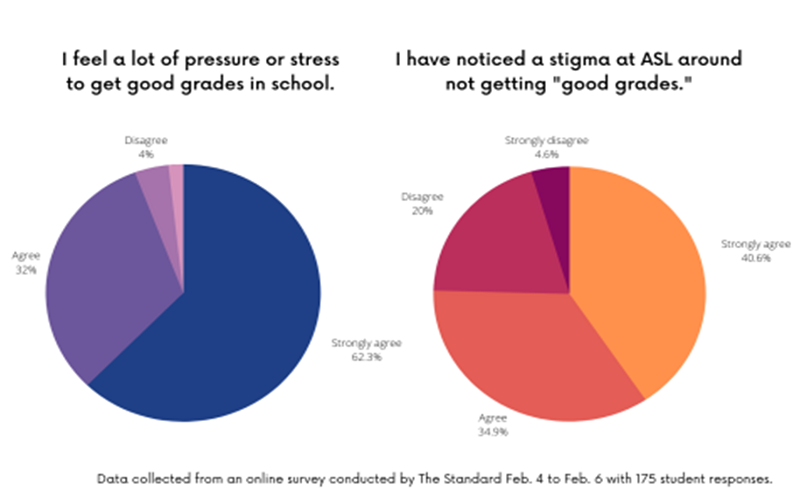Do you know according to a recent survey, it has been found that 26% of children of age (5-7 years) feel anxious. On top of that 43% of the students agree that they feel anxious and pressured to perform well in their respective class.

Source: standard.asl.org
However, to identify whether the students have anxiety or not is sometimes easier to identify and sometimes it’s harder to identify. For example- if students are feeling nervous before appearing for a test or going to school situations can be easily identified as students having anxiety issues.
On the other hand, when students behave disruptively, get angrier, don’t want to eat, show ADHD symptoms, or even Learning Disorder symptoms can also be a sign of anxiety which can be tough to identify.
Anxiety can be of various types and may triggered for various reasons, which makes the teacher’s job difficult to detect in the classroom. However, one thing you will find common in every situation is that it cripples the brain of every child who has anxiety issues which makes their school life harder.
If you also tend to see these kinds of characteristics in your classroom, then worry not we got you covered.
In this blog post, we will get to understand in-depth General Anxiety Disorder (GAD) and helpful tips to recognize anxiety in students and what might be the cause for it.
Different Types of Anxiety
There are various types of anxiety with which your students might be dealing or struggling with. Let’s get to explore what are those types:
Generalized Anxiety Disorder (GAD)
Children with Generalized Anxiety Disorder (GAD) always tend to worry about their academic performance and always struggle to find perfectionism.
Separation Anxiety
Children might get too much attached to their caregivers and don’t want to get separated. Children with separation anxiety might have a hard time during school drop-off and even throughout the day in school.
Social Anxiety
Children with social anxiety might be too conscious to socialize which makes it harder for them to participate actively in class or within a group of peers.
Obsessive-Compulsive Disorder (OCD)
Children’s minds are already filled with unnecessary stressful thoughts. However, children with OCD often increase their anxiety levels more by being too obsessive about every task like- washing their hands.
Specific Phobias
Children with specific phobias tend to fear particular things, objects like- animals, heights, etc.
Helpful Tips to Recognize Anxiety in Children At School
1. Inattention and Restlessness
Whenever students are not being able to sit still or pay attention in class teachers tend to think it’s a sign of ADHD, but anxiety could also be the reason. When children are anxious, they also have a hard time focusing on whatever lesson is being taught in the classroom by being overwhelmed with other worrying thoughts. You might notice some children at one-point children might be fully focused on the classroom and then the next moment their thoughts are drifting away to other thoughts.
To help with this, you can try incorporating engaging teaching methods, to keep them hooked with the lesson being taught.
2. Maintaining Regular Attendance
It’s very common for children to refuse to go and attend school daily. However, it could also be a sign of children having anxiety. After summer vacation or sick days rejoining the school rates tend to be lower because children have a hard time getting back to their routine.
One more reason for children to not go back to school is they have a separation anxiety problem and don’t want to get separated from their parents or caregivers. If children with separation anxiety somehow even attend school, they either find a way to contact their parents, and caregivers or miss them and become sad.
If you notice this tendency, then you know what’s the reason behind it.
3. Showing Disruptive Behaviour
Disruptive behaviour or acting out due to being angry might not have a direct relation to anxiety but have some connection to it. Whenever, you witness that children are acting out like- kicking tables and chairs, not adhering to any school rules, or listening to you then you need to understand that there’s an underlying root cause that is related to anxiety.
One more indication of children having anxiety is that they ask the same question repetitively because they are worried and want reassurance.
Children with anxiety also have characteristics of being aggressive. When they feel threatened or upset by any situation then their fight or flight mode gets triggered to protect themselves. In this kind of situation, they tend to act out disruptively by attacking other students, throwing stuff away or kicking or pushing desks or chairs.
In this situation, try to be supportive of children with anxiety and make them feel comfortable to share their thoughts and feelings without any judgments.
4. Have a Hard Time To Answer In the Classroom
Most of the time those children who deal with anxiety do exceptionally well in final exams and homework, but when they are called into the classroom to answer any question related to the topic that is being taught, they feel lost.
When they are being called, they try to break eye contact and try to make themselves invisible. They might know the answer very well but due to overthinking, stress, and judgments of their peers, they try to avoid answering altogether.
To help your children with anxiety, try to create an inclusive and judgment-free environment and encourage them to answer the questions. Assure them that even if they answer wrong, nobody’s going to judge them.
5. Frequent Feelings of Discomfort
Anxiety can also negatively affect children’s well-being. They may have bad headaches, stomach-ache, nausea, or even the urge to vomit. Sweaty palms, irregular heartbeat, and tense muscles can also be a sign of children having anxiety.
To deal with this, you can strive to create a positive and inclusive classroom environment where they feel welcomed and do not feel excluded.
6. Having Self-Doubt
Sometimes children might start to doubt their abilities on a particular subject which might look like they are going through a learning disorder. However, most of the time the cause is just anxiety.
Children tend to compare themselves with others, so other children might be good at some subjects but children struggle with that subject which brings anxiety.
To help your children with anxiety, you can help them understand that every child has their own set of strengths and weaknesses. So, focus on your strengths and work on your weaknesses to overcome them.
7. Not Submitting their homework
You might come across students who are refraining from submitting their homework. The normal first thought of every teacher would be that they didn’t do their homework. However, it might be the case that they did their homework, but they think that their quality of work is not good enough compared to others or not perfect enough. This is also a sign of Obsessive-Compulsive Disorder (OCD).
To combat this situation, you can make children with anxiety understand that the primary goal of doing homework is to improve. So, it’s completely fine that they make any mistakes or errors in it, this will only help them to improve further.
8. Avoid any Socializing Activities
Children with anxiety always tend to avoid any social gatherings, or there are too many people around. They have a hard time when they have to speak in front of the class, give presentations, interact with their group of peers, or work in a group.
To help children with anxiety to overcome their social anxiety by starting small like- you can encourage them to introduce themselves in front of the classroom.
Understanding Children With General Anxiety Disorder To Support Them Better
Identifying children with anxiety is not an easy task. Most of the time teacher tends to think that children are going through disorders like- ADHD, Dyslexia, where the reason is anxiety. By going through the above tips to recognize general anxiety disorder and also help you to support children with anxiety in a better way.
Additionally, if you want to understand in-depth and want to learn better tips to support children with anxiety then consider pursuing courses like online teacher training course in Malaysia, where you will get support from top expert trainers which will also make you the best possible teacher around the globe.




